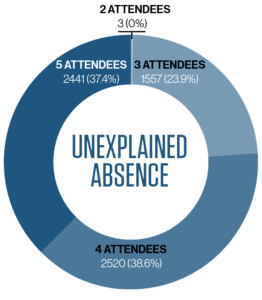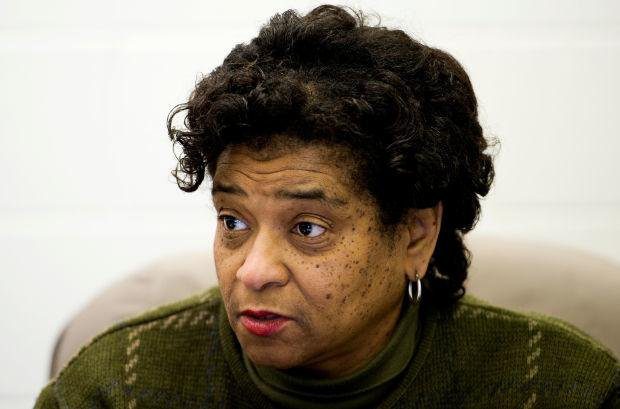It was Josh Carse’s big day. He awoke before sunrise on March 19, 2021, and donned his khaki prison uniform, ready to learn if he could leave the Community Corrections Center in Lincoln. His fate, like more than a thousand prisoners each year, awaited the judgment of the Nebraska Board of Parole.
Carse liked his chances. At his February parole hearing, board chairperson Rosalyn Cotton had told him he should get out next time if he stayed misconduct free, Carse recalled.
Carse had kept on his best behavior for those 28 days. He had already spent 15 months in prison on drug charges. He couldn’t wait to get home and see his daughter.
As Carse and others sat awaiting their hearings, another prisoner asked a crucial question.
How many parole board members are here today? Three, a guard told the crowd.
“Is Ms. Cotton there?” Carse asked. Nope, the guard said.
“Damn,” he thought.

Once in the hearing, he sat in a folding chair, dutifully answering questions from the three present members of the full five-person board. Carse suspected his fate before he heard the board’s motion: Deferral. He would stay in prison.
He needed three yes votes. That became tougher, he said, when only three board members showed up.
“As soon as I found out that two of them weren’t going to be there, I knew I wasn’t going to get out,” he told the Flatwater Free Press.
Carse and other Nebraska prisoners have learned, the hard way, that how many parole board members show up for work can influence whether they are paroled or stuck in prison for another month, or two or longer.
The full board appeared together at less than half of all hearing days between May 21, 2018, and December 8, 2021, according to data the parole board provided the Flatwater Free Press in response to a public records request.
The parole board voted on 6,521 individual cases during that time period. Only 2,441 cases — roughly 37% — were voted on by all five members.
Board members occasionally recuse themselves because they have some connection to the parole candidate. They sometimes step out of a hearing and miss several votes. But they accrue the lion’s share of their missed votes when they aren’t present for all hearings on a given day.

The missed votes are happening despite the fact that parole board members, appointed by the governor, were each paid $84,712 last year, according to the Flatwater Free Press’ state salary database. Cotton, the board’s chairperson, made $92,787. All five positions are full-time, and state statute bars them from other employment.
These absences from hearings are occurring even as the state continues to struggle with chronically overcrowded prisons.
And whether the full board appears at a hearing does matter, according to interviews with former prisoners like Carse and a data analysis done by the Flatwater Free Press and checked by three outside experts.
The board motioned to grant parole in 62.6% of hearings attended by the full board. The rate was 56.2% when four or fewer members showed up.
That difference could have kept nearly 200 parole-eligible prisoners behind bars longer, costing the state hundreds of thousands of dollars in the past three years, the analysis shows.

“If you’re a parole board member, you should be at the hearings, period,” said Mario Paparozzi, one of the country’s leading parole researchers and the former chairman of the New Jersey State Parole Board. “The primary thing that you do is to hear cases…assess risk and figure out who can be successfully reintegrated back into the community.”
The Nebraska Board of Parole, oft ignored as state leaders debate corrections issues, holds ample sway over the amount of time many actually spend behind bars. Nebraska’s criminal sentences normally come with a range between a minimum and maximum stay. Judges set that window for prisoners to present their cases to the board, which decides whether they should rehabilitate under supervision outside of prison — the process known as parole. Nearly 15,000 Nebraska prisoners have gone before the parole board in the past decade.
The parole board’s rules stipulate that board members can take personal time off “when such absence does not unduly interfere with the Board’s ability to perform its statutory duties.”

In a statement emailed to the Flatwater Free Press, Cotton, the board chairperson, said that the parole board works diligently to ensure a quorum — at least three members — is present at every hearing. She said it’s board policy that members schedule their leave during the first two weeks of a month to avoid conflicts with hearings, which generally happen later in the month.
She denied that having fewer than five members present impacts a prisoner’s chance to get parole. She declined to detail the reasons for her missed hearings and the missed hearings of other board members.
“Contrary to the implication of your line of questioning, the absence or attendance of any individual Board member does not generally dictate a motion nor does it influence the outcome of a particular hearing,” she wrote in her emailed statement. “Each individual case is considered on its own merits and circumstances by Parole Board Members.”
Alex Reuss, spokesperson for Gov. Pete Ricketts, didn’t respond to a phone message and two emails seeking comment.
After receiving Cotton’s statement, the Flatwater Free Press sent three emails to all board members seeking comment on their individual absences and how they affect the parole rate. Only board member Bob Twiss responded.
“I see no true findings,” Twiss wrote. “Each case is individual and I see no real deadlocks out of the thousands of cases we heard.”
Parolee John Gibbs may disagree.
Gibbs appeared before the parole board on Nov. 19, 2021. Three board members voted on hearings held that day.
But for unknown reasons, only two board members heard Gibbs’ case.
“We’re gonna have to defer you to next month because you have to have three board members for a parole hearing…We’ll see you then. We can’t do it today cause we only have two board members,” parole board member Mark Langan, filling in for chairperson Cotton, told Gibbs in an audio recording of the hearing.
“Do you have any questions?” Langan asked.
After a few seconds of silence, Gibbs said, “No — Oh, yeah, I do. So — I know I’ve been doing good.”
The 55-year-old, who had been imprisoned for 23 years for second-degree murder in Platte County, told the two board members he had received a positive psychiatric evaluation, rented a place where he could live once released and was staying out of trouble.
“It’s a bummer that there’s not enough people today for my final hearing… ‘cause I would like to have a chance to see what you guys are thinking about if there was a problem, not like not having enough people, but then what you’re thinking,” Gibbs said. “You know what I mean?”
“All we’re gonna do is defer it to next month and we’ll discuss it then,” Langan said.
“Okay,” Gibbs replied.
Corrections records show that he was granted parole and released Dec. 15.
Gibbs is one of only three prisoners who had their case heard by a board of two members, short of the three-member quorum in the timeframe of the data available. He couldn’t be reached for comment.
Experts and former prisoners said who’s at the meeting matters.

Dominique Morgan, executive director of Black and Pink, a prison reform and prisoner advocacy organization, remembered board members missing or being late to her hearings. She served sentences for various charges between the early 2000s and mid-2010s.
“Sometimes the board would not even feel comfortable voting on you, because they wanted a specific board member there,” she said. “So they would say ‘well, we’re gonna table you until next month.’”
She said she attended hearings for more than 100 Black and Pink clients between 2018 and 2020. “I did not ever recall a full board right there,” she said.
The missed votes and subsequent delays can disrupt the prisoners’ plans, she said, including the job and housing they have lined up. The board members “being derelict in their duties and not being accountable” has a huge impact on parole candidates, Morgan said.
Keile Charles says she has seen the impact that members missing hearings can have on potential parolees. When she testified in December 2021 at her brother Joel Jones’ hearing, she said that the board almost denied his case — a decision that slows or ends the chance of parole altogether — although two members missed the meeting.
The three-person board ultimately decided to defer his case for six months, Charles said. Her boyfriend Danton Cox and friend Zebulyn Leinhos both got deferred by a partial board.
“These parole board members should be present — every single one of them every single time, for the entire duration,” she said. “I don’t think that they should be able to make the decision … [on] the inmates and the outcome for their life… until they’ve actually heard and reviewed everything as a whole with the inmates.”
Paparozzi said it only takes one absent member to disrupt the balance in a parole board’s ideologies, which can range from lenient to strict. “When the balance isn’t there, it can be skewed in terms of increasing rates of parole or decreasing rates of parole, both of which are problematic from a public safety point of view,” Paparozzi said.

Sen. Steve Lathrop, chair of the Legislature’s Judiciary Committee, said he has received a letter from a prisoner complaining about some board members not showing up to hearings.
As some members of the Nebraska Legislature continue to push for changes aimed at reducing overcrowding, Lathrop said parole delays resulting from members missing hearings are “concerning.”
“I think it’s incumbent on the governor to appoint people that are present,” Lathrop said.
He said it’s problematic that a board member essentially has “veto power” when the board is missing two members at a hearing.
Carse suspects that’s what happened at his March hearing. Twiss, who votes no on parole motions 17% of the time — the highest rate on the board — was one of the three board members present that day.
On Carse’s parole record, the reason for deferral in March 2021 is listed as “Need for a full Board,” according to the data.
Carse said he felt “discouraged” after learning that he’d spend at least another month in prison. As part of his work release program, he had been working for motorcycle manufacturer Kawasaki and secured another welding job in Fremont. He had completed substance abuse programming for his drug charges, and had transitional housing lined up.
April rolled around. Carse bought a new outfit for his new hearing — a blue shirt, a tie and dress pants. Nothing else he did changed, he believes.
Except this time, four members showed up. They unanimously voted to grant him parole.
He said he walked out of prison twenty minutes later.



8 Comments
This is appalling. I would be terminated from my job if I missed that much time was was that derelict in my duties. I would like to see FFP stay on this. I know I will follow-up with my state senator.
Do Parole Board Members get evaluated once appointed by the Governor? They can’t have another job while serving on the Board so attending all hearings should be a basic job expectation. If they were employees of any other organization, they would be counseled and out the door if they couldn’t fulfil the basic job expectations of attending the hearings. It is a crime to keep them on the government payroll when their attendance rate is so appalling! Thanks for the excellent reporting. It makes the inscription on our capitol building meaningful: “The salvation of the state is watchfulness in the citizen.” – Hartley Burr Alexander
I agree with you completely! I’m thinking we should apply for the Parole Board positions.
Regarding Mr Habib Olomi — is he now only on the Parole Board or is he still generating the kind of reports noted on this web link as an employee of the state?
https://parole.nebraska.gov/content/collaborative-work-between-nebraska-board-parole-and-center-operational-excellence
“A question was presented during the Board Meeting as to how our agency was doing statewide in comparison to other State Agencies. The response was that of the 26 Process Improvement Coordinators, Mr. Olomi was one of many that achieved their entire 2018 goals. The credit goes to the agency Sponsors (2), Project Teams (3), Project Owners (3), and the support of the Center of Operation Excellence.”
Such an important and illuminating analysis. By my count, there were approximately 925 business days when most of us were working during the 3.5 years of this analysis. Those who were on the board that whole time were asked to show up in person for only 322 of those 925 days. Yet, it was commonplace for members to miss even another 40-60 beyond that, and they all missed around the same percentage. It absolutely shows a culture of disrespect in that body to the inmates and all of us as taxpayers they are responsible to. Here’s hoping this article leads to some much needed change. Thank you, Yanqi and FFP!
Wow. Exactly why we need independent journalism. Part time job with full time pay, and they can’t be there.
What could be more important in that job than attending parole hearings? What else are parole board members expected to do for the more than $84k they make? This is unconscionable, particularly with our prisons bursting at the seams.
This is why we need a total reform of our justice system.